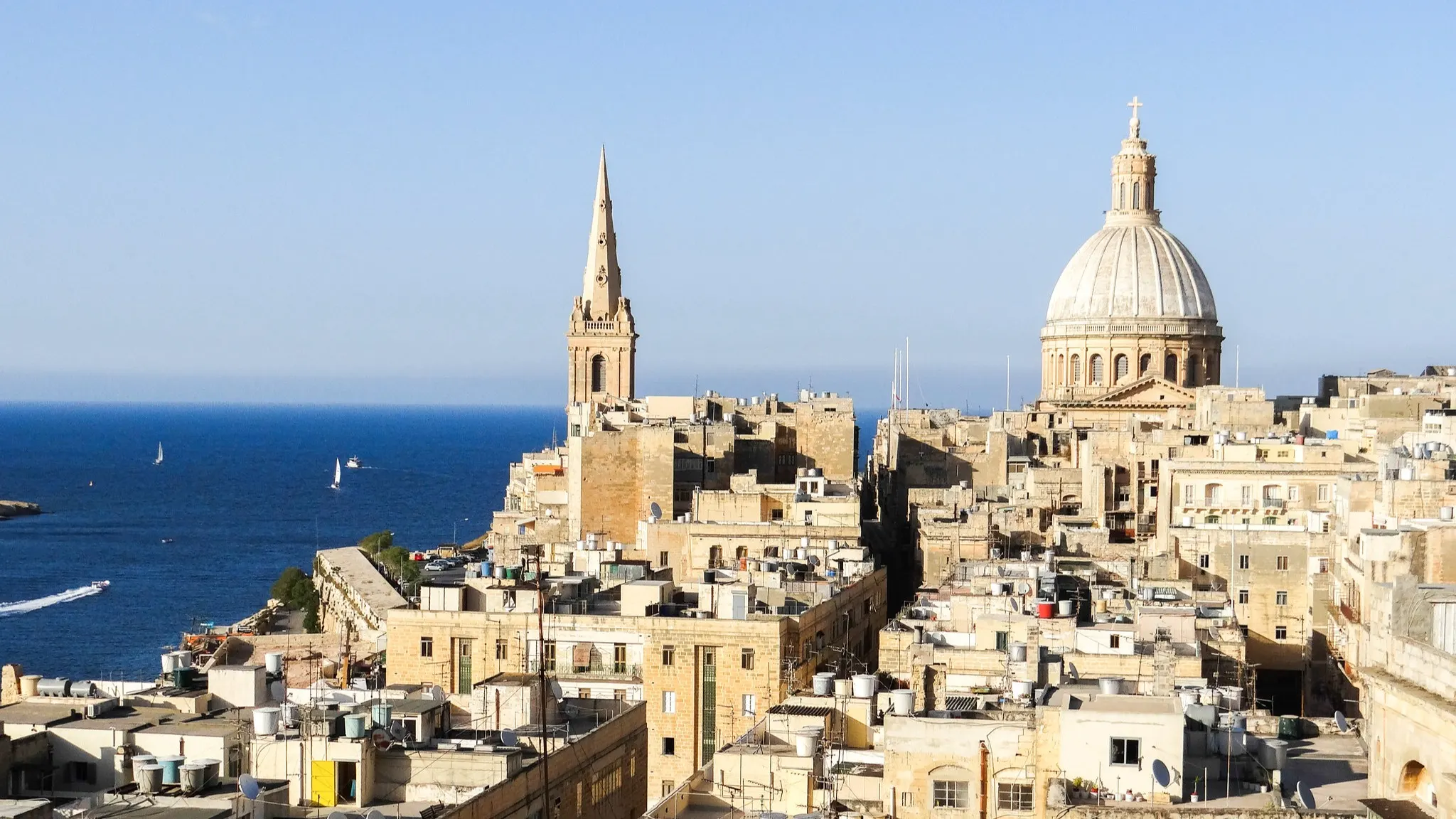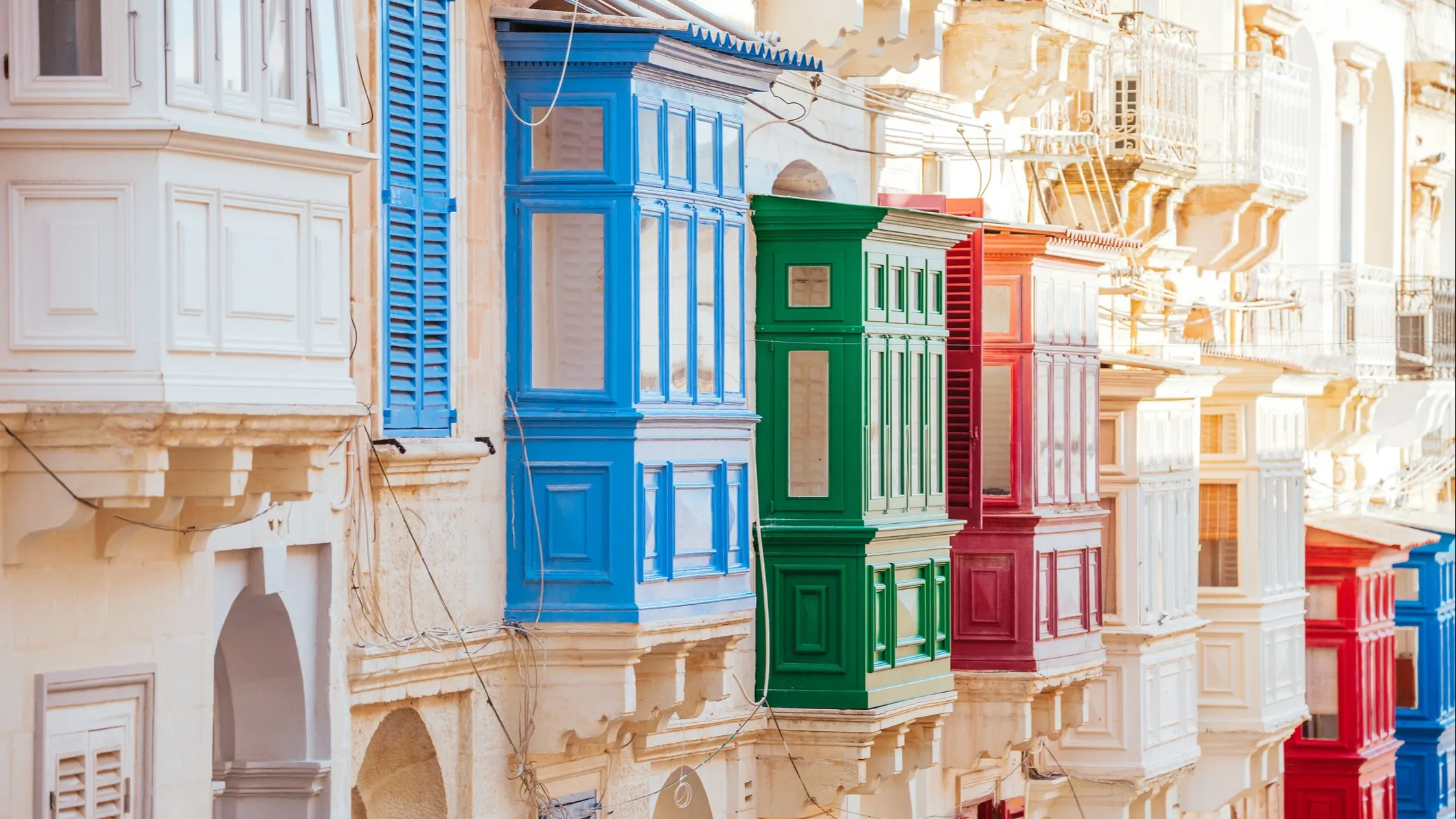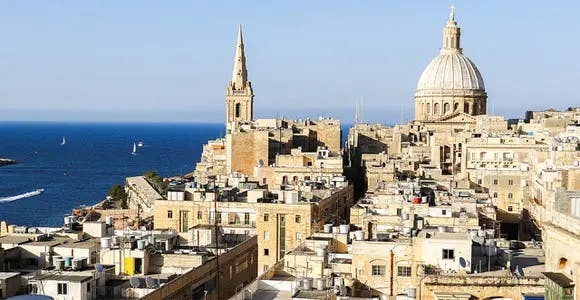Malta, or officially the Republic of Malta, is a small archipelago of six islands and islets in the center of the Mediterranean—taking its name from the main island in the group. The islands of Malta and Gozo (combined population of approximately 518,000) are the main inhabited islands, with Comino having a permanent population of just two. With temperate seasons considered sub-tropical, many North Americans are considering Malta as an EU option for the Mediterranean island lifestyle.
While Malta has seen a housing boom and an influx of expats over the last decade (due in part to the streamlined process to apply for visas, residency, and citizenship), it’s still considered an affordable place to live when compared to some of its EU neighbors.
Malta offers a favorable tax environment, especially for those foreigners setting up a business, and has a taxation agreement with Canada and the U.S.—meaning no income or capital gains can be double taxed.
Many retirees find it challenging to learn a new language later in life, which makes Malta a popular choice compared to the rest of the EU since English is one of the official languages on the islands. Nearly everyone speaks English, and the schools are bilingual.

Culture
Like the rest of Europe, Malta has a rich and storied history dating back to the dawn of civilization. The Maltese Islands went through a golden Neolithic period, with evidence of the first inhabitants dating back to 5200 B.C. From that time, mysterious temples remain dedicated to the goddess of fertility (the Tarxien Temples are now designated a UNESCO World Heritage Site). After that, the Phoenicians, Carthaginians, Romans, and Byzantines all conquered and left traces of their cultures behind. Although Malta has no rich resources to speak of, it holds a prime location in the middle of the Mediterranean.
In 60 A.D., St. Paul was shipwrecked on Malta on his way to Rome and brought Christianity to the island. To this day, the Maltese are overwhelmingly Catholic—celebrating all the major Catholic festivals with exuberant fanfare.
The Arabs conquered the islands in 870 A.D. and introduced the influence of Arabic on the Maltese language. Until 1530, Malta existed as an extension of the Kingdom of Sicily, and the Normans who ruled over Sicily also governed the Maltese Islands. Charles V bequeathed Malta to the Sovereign Military order of St. John of Jerusalem, and they ruled Malta from 1530 to 1798. Following the Great Siege of 1565, the Knights took Malta through a new golden age, making it a key player in the cultural scene of 17th and 18th-century Europe. During this time, the arts in Malta were all the rage as the Knights commissioned famous European artists to decorate Malta’s many churches, palaces, and auberges.
In 1798, Napoleon Bonaparte took over Malta from the Knights on his way to Egypt. The French rule on the islands was short-lived, however, as the Maltese requested English help in fighting against the French.
Malta remained part of the British Empire for nearly 150 years - until 1964, when Malta became independent. The Maltese adopted the British system of public administration, education, and legislation. Therefore, you’ll see a heavy British influence across the islands even today—from driving on the left, to the iconic red phone boxes, three-pronged square plugs, and English as an official language.
Malta officially became a republic in 1974. The British military bases on the island closed permanently in 1979, and Malta joined the EU in May 2004, and later the Eurozone in January 2008.
Traditional Maltese food is rustic, and based on the seasons. Must-tries include lampuki pie (fish pie), rabbit stew, bragioli (beef olives), kapunata, (Maltese version of ratatouille), and widow's soup, which includes gbejniet (sheep or goat's cheese). Maltese bread, called Ħobża, is a daily staple for locals and expats. With such a melting pot of cultures, you can find food from all over the world—if you have a hankering for Thai, Indian, Italian, Turkish, or good ol’ pub grub, Malta has you covered. If you enjoy a cold brew, the local national beer Cisk (pronounced chisk) is a favorite lager-style beer since 1929. Although Malta is one of the smallest wine-producing countries in the world, their wines are quite good and very affordable.
To answer a culturally burning question… Is the Maltese breed of dogs actually from Malta? The Maltese is an ancient breed, one of several small "bichon" dogs found around the Mediterranean for thousands of years. The exact place of origin remains unknown. However, most historians pinpoint Malta for the development of the breed. Thus, the name.
Although the Maltese dog has a long history in Malta, the French Bulldog is the most popular breed of dog currently on the islands, but it may be worth noting they’re not particularly well equipped for the hot summers in Malta. The national dog is the Pharaoh Hound — or Maltese Rabbit Hound—known as “Kelb tal-Fenek,” meaning dog of the rabbit in Maltese. These dogs still play an important role for Maltese hunters and farmers, who respect and admire their breed.

Language
Malta has three official languages: Maltese, English, and sign language. Signage and official forms are also in both languages, so it’s unlikely you’ll have any frustrating lost-in-translation moments doing any official business, or even general shopping or social activities.
Maltese is a Semitic language developed from a dialect of Arabic and is closely related to the Western Arabic dialects of Algeria and Tunisia. Strongly influenced by the Sicilian language, Maltese is the only form of Arabic to be written in the Latin alphabet. Yet, it uses some Arabic-influenced letters – thus making it a bit more challenging to read for expats. For example: Ċ, Ġ, GĦ, Ħ, IE, Ż.
If you plan to settle in Malta or do business in the local market, you should take some Maltese language classes to learn some basics. There are schools for foreigners on the islands, and you can always hire a local tutor to work on those linguistic skills. However, it’s certainly not necessary to live a fulfilled expat life here.
Healthcare
Unless you are an EU citizen, you’ll need to have private healthcare insurance as enforced by the Maltese government once you apply for a visa, residency, or citizenship. Wait to buy a local policy in Malta, because they are considerably less expensive than you would find in the U.S.
Malta has excellent healthcare, which is up to EU standards, and relatively affordable. There are two main private medical centers on the island of Malta, with several other smaller hospitals and clinics serving every community on the island.
Like most countries around the world, there’s a public system (there are eight government healthcare centers on the islands) and a private system. You can visit any private clinics or hospitals with your private insurance, and many doctors work in both sectors. Even many Maltese use the private alternative to avoid the long wait times that are typical in public healthcare for non-emergencies. As a resident, you can use the public system also, but you will need to pay out of pocket, since you have yet to pay into the system.
A cost guide for private medical pricing:
Physician visit at a pharmacy $25
House call $40 to $50
Ultrasound $200
MRI starting at $250
Dental check-up/scaling $50
Standard filling $60
Root canal $300-350
Community
Malta is a country rich in expats. The country’s total population is approximately 518,000, with an astounding 115,000 non-Maltese nationals legally living on the islands. This means just over 22% are foreigners, creating a beautiful multicultural atmosphere. Most expats are from the UK, but you will hear dozens of languages walking the streets.
Because English is so widely spoken, fitting into the community immediately is easy. There are many options to get involved and meet friends quickly. One of the most active organizations on the island is the local chapter of Internations. Basic membership is free, and you can start making local connections immediately through their platform. You can opt in for the events email and fill your social calendar with wine tastings, art tours, water sports, and a number of other meetups.
Many expats also join the Royal Golf Club. Even if you don’t play golf or tennis, there’s a clubhouse and a very active social scene. Associate memberships are approximately $2000 per year, a fraction of what a club membership costs in the UK or the U.S.
Pickleball has also recently taken off as a new sport in Malta. And with the gorgeous Mediterranean Sea surrounding the islands, you can participate in watersports activities. There are currently 75 dive sites listed around the islands, including reef, wreck, and cave dives. Or you can join a sailing club and take to the open seas.
Malta is well known for its festivals, primarily in the summer, fall, and spring. Some are Catholic religious festivals or feasts (with plenty of merrymaking), so you can quickly get involved in your local church and align yourself into the community. Or you can volunteer with any of the other festivals—for example, The International Arts Festival, RITMU (a Mediterranean folk festival), dance and jazz festivals, etc. In Malta, there are events and lots of fireworks (a Maltese tradition) happening every week.
Work and Business
With any number of visas (work, digital nomad, residency), you can work in Malta—which is especially easy if you work for an overseas company and are paid into your foreign account. Malta has been a leader in the industries of iGaming and Cryptocurrencies for the last decade, making it easy to set up a business as a foreigner.
Malta offers several attributes, like the low setup cost, favorable tax rates, tax incentives, and human resource effectiveness, making it an attractive base for a business.
There are a number of business development companies in Malta that can help you legally set up a business in a very short period of time. They will take you through the basic steps from start to finish.
Step 1: Choose Your Company Type
There are four different types of companies you can choose from when setting up shop in Malta:
Limited Liability Company
General Partnership
Single Proprietorship
Overseas Companies
Step 2: Choose Your Company Name
The name must represent the company’s endeavor, not already registered, and not be offensive.
Step 3: Prepare the Necessary Documentation
These documents must be prepared to be submitted to the Registrar of Companies Association of Malta.
The type of company;
Complete identification of its subscribers;
The company name;
The company’s registered office in Malta;
The objects of the company and the main trading activity;
The amount of share capital, its division into shares, the number of which taken by each subscriber, and the rights attached to each class of share;
The number of directors and their identifications;
The name and residence of the first company secretary;
If fixed, the period of duration of the company;
Identification of each shareholder, director, legal and judicial representatives, and company secretary.
Evidence of paid-up share capital should also be produced and can be submitted in the form of bank deposit advice.
A registration fee must also be paid – the amount depends on the company’s authorized share capital.
Step 4: Gain a Certificate of Registration
A Certificate of Registration will be issued if all the necessary documentation is provided and accepted by the Registrar. This certificate proves that the company has come into existence and is authorized to conduct business starting from the date of issuing.
The time required to incorporate a company in Malta depends on the type of company being registered. If all is in order, this normally takes between 5-10 days.
Step 5: Register for VAT in Malta
Step 6: Start Doing Business!
There are several relocation companies in Malta who can help with the overseas move or ones who go beyond and set up your new life there—plus start the filing for residency. Because English is an official language and forms are also bilingual in Maltese and English, the need for a complete relocation package is most likely unnecessary. Your real estate agent or leasing agent will be a wealth of information on the ground.
Also, if you are applying for residency with an agency, your Advocate & Commissioner for Oaths will be able to supply legal information beyond your residency application
Suppose you are looking for a lower cost of living, access to affordable medical care, lots of sunshine and mild Mediterranean weather, an English-speaking base, easy and cheap flights to dozens of European cities, and favorable tax laws. In that case, you may want to add Malta to your EU list of possible countries to call “home.”








